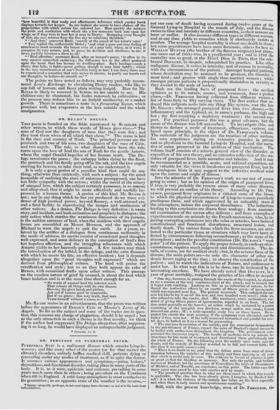MR. READE'S DELUGE.
Tins poem is founded on the fable mentioned by . SCALTGER and other writers, to which these words of Moses gave rise—" The sons of God saw the daughters of men that they were fair ; and they took them wives of all which they chose." The scene is laid in the time and country of Noah. The principal persons are the patriarch and two of his sons, two daughters of the race of Cain, and two angels. The talc, or what should have been the tale, turns upon the love of Irad the son of Noah for the gentle Astarte, whom the angel Oraziel beguiles of her human troth. The De- bin terminates the poem ; the unhappy ladies dying by the flood, the patriarch and his family guiltg off m the ark, and the two angels starting for heaven, to take theVtrial, as we understand it. It is only a great genius of a peculiar kind that could do any thing, otherwise than satirically, with such a subject : for the mind incapable of realizing the state of existence presupposed, can have but little sympathy with the actors; whilst the moral of the misery of unequal love, which the subject certainly possesses, is so remote and allegorical, that it might be more effectively and usefully im- pressed by a human theme. A genius of this kind Mr. Rcanc is not ; nor in any thine which he has yet produced do we trace evi- dence of high poetical power, beyond fluency, a well-attuned ear, and a fatal facility in reproducing the images and sentiments of other writers. As a drama, The Deluge is very defective : it wants story, and incident, and both animation and propriety in dialogue; the only action which startles the wearisome discourses of its persons, is the sudden entrance of Irad, when the maidens with their angelic lovers are assembled on Mount Hermon, and the approach of Michael to warn the angels to quit the earth. As a poem, re- lieved by the artifice of a dialogue from continuous uniformity in the mode of address, its merits consist of occasional good thoughts well expressed, and some delicacy in the conception of Irad's firm but hopeless affection, and the struggling reluctance with which Astarte yields to her heavenly passion. A few readers may think the introduction of the infidel, in the deluge, and the calm firmness with which he meets his fate, an effective incident ; but it depends altogether upon the "good thoughts well expressed" which are derived from philosophical writers. The herd will praise the versification and style; • but to us they both appear an echo of BYRON, with occasional drafts upon other writers. This passage on the cureless nature of grief by counsel, is about the best which bears isolation and is at the same time short enough for us.
"No words of counsel heal the infected mind, That colours all things with its own disease, Showing the giver harsh and pitiless. Ask not if human grief be reasonable But if we grieve: this very truth, that man Vexes himself without a cause, is evil."
Mr. READE states in an advertisement, that the poem was written before the appearance of BYRON'S Cain or Mount:is Loves of the Angels. So far as the subject and some of the topics are in ques- tion, this removes any charge of plagiarism, should it be urged ; but as the only attraction in such a theme is its first novelty, we think if the author had suppressed The Deluge altogether, after suppress- ing it so long, he would have displayed an unimpeachable judgment.
• Genesis, vi. 2.


























 Previous page
Previous page